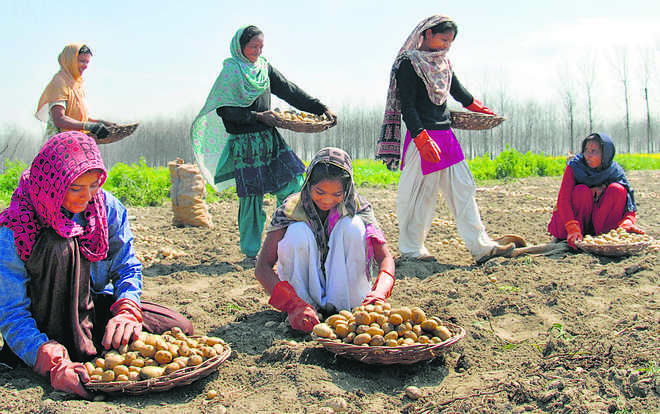
SS Chhina
Senior Fellow, Institute of Social Sciences, New Delhi
Contract farming could be the best option in Indian agriculture to optimise the use of scarce resources and enhance output and income and to mitigate the uncertainty in price and marketing. Most developed countries have adopted contract farming. Even the countries with much higher land-man ratio like Canada, Australia and America have adopted it since long.
It is inscrutable and inexplicable that India, which has a small land-man ratio — with only 2.4 per cent of the area compared to 17.6 per cent of population of the world — has not adopted it. Ostensibly, it might be to provide more freedom to farmer’s choice. Even as now the draft of Agricultural Produce and Live Stock contract Farming Act 2018 (Promotion and Facilitation) has been prepared, its implementation depends on the state governments as agriculture is a state subject.
The minimum support price and state procurement are the main factors for the success in the production of wheat and paddy in India, turning the country from a food importing position to a food exporting one.
The Central government announces minimum support prices for 24 crops but procures only wheat, paddy and cotton and, that too, only in a few states with the plea that the government does not procure in states where the output of such a crop is deficit because there is no fear for the depletion of the price of that product.
There are hundreds of crops being grown in different areas, based on the seasonal and geographical variation. It is impossible that the government may procure each and every crop from everywhere. Contract farming can fill this gap. Agro-processing units and trading companies under the patronisation of the government can make such contracts in all areas for different crops.
Some agro-processing units have practised it in the past where the unit had made a contract with farmers for the supply of raw material. Contracts for milk, mentha, maize, sugarcane etc had been made, where the quantity, quality, period of supply and price were settled.
Despite the benefit of contract farming for the farmer, the company and the nation, why it could not become popular is a matter of concern. Legal complications might have been an impediment in its promotion. For example, Pepsi made contracts with farmers, mostly big ones, to procure tomatoes. But why Pepsi discontinued the practice within two or three years was bacause the farmer as well as the company both were the culprits at one or the other time. If the price of the crop was higher than the contract price, the farmer preferred to sell outside. If another time the company could not procure the whole output of the farmer, the farmer faced a big loss. And, there was no legal remedy. If it was, it was too long and complicated, contrary to the procedure in developed countries along with a complete insurance cover for the farmer.
Contract farming is more beneficial than the minimum support prices. The company provides technical services to obtain the best quality output. It conducts research for the product and provides extension services helpful for the product. It also provides inputs. Such services cannot be provided by the governments.
India needs diversification in farming. More crops are required to be produced in the different areas. Diversification of crops enhances the workload and makes for better distribution of labour and sources. The government, universities and experts have been appealing for diversification, but nothing much has been achieved. Contract farming can promote diversification that can then become the basis for the agro-processing units. The agro-processing industry in India has not developed. The lack and uncertainty of raw material in the shape of crops is a main reason for it. Agro-processing units are being installed in cities. If set up in rural areas, they could precipitate the development of the non-farm sector, with the opening of a number of job opportunities, which in turn could lead to the prosperity of not only the rural areas but also of the country as 72 per cent of our population resides in these areas.
Contract farming of developed countries cannot be the model for the Indian contract farming. The developed countries have different geographical and economic conditions. For example, in Canada, only one crop — either wheat or maize — is obtained in a year: wheat in one area, maize in the other and potato in still another. But in India, as 83 per cent holdings are small-scale, more fields are yielding more than one crop a year. Different crops are obtained in a year. Food security is needed in the country. The farmer needs a sympathetic attitude and insurance and surety of marketing for his product.
In the case of Punjab, staggering results were obtained in the yield of paddy. At present, 2.8 million hectares of area is occupied by this crop. Even if this area is reduced to 1.5 million hectares, there would be no impact on food security. Water, that was abundant in Punjab is emerging as a big problem. Paddy crop is considered to be the major reason for the depletion of the water table in the state. Contract farming, with the assuance of higher income, is the best alternative to secure water and promote other crops in the state.



























